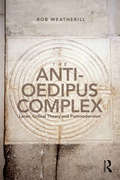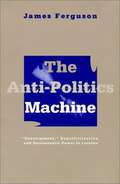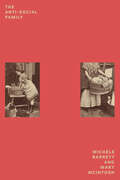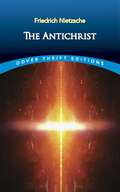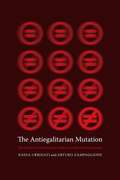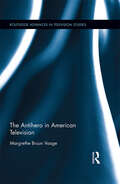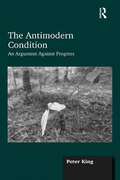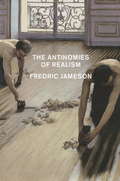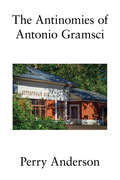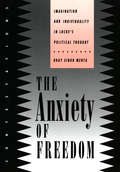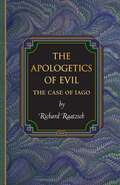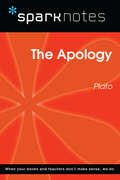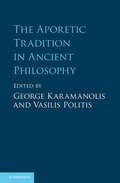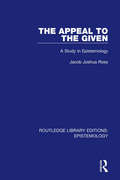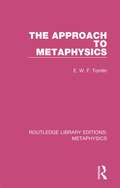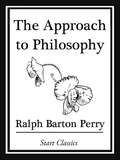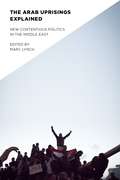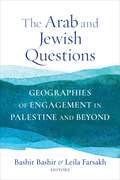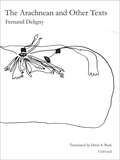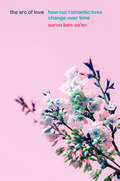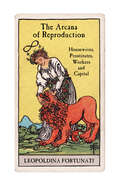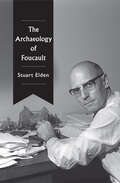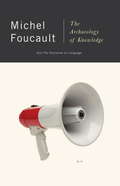- Table View
- List View
The Anti-Oedipus Complex: Lacan, Postmodernism and Philosophy
by Rob WeatherillThe Anti-Oedipus Complex critically explores the post ‘68 dramatic developments in Freudo-Lacanian psychoanalysis and cultural theory. Beginning with the decline of patriarchy and the master, exemplified by Freud’s paean for the Father, the revolutionary path was blown wide open by anti-psychiatry, schizoanalysis and radical politics, the complex antimonies of which are traced here in detail with the help of philosophers, such as Nietzsche, Baudrillard, Levinas, Steiner, Žižek, Badiou, Derrida and Girard, as well as theologians, analysts, writers, musicians and film makers. ? In this book, Rob Weatherill, starting from the clinic, considers the end of hierarchies, the loss of the Other, new subjectivities, so-called ‘creative destruction’, the power of negative thinking, revolutionary action, divine violence and new forms of extreme control. The book raises the following questions: Does the engagement of the Radical Orthodoxy movement offer some hope? Or should we re-situate psychoanalysis within a ‘genealogy of responsibility’ (Pato?ka / Derrida) as it emerges out of the sacred demonic, via Plato and Christianity? The Anti-Oedipus Complex will be of interest to psychoanalysts, psychotherapists, counsellors, social workers and scholars in critical theory, philosophy, cultural theory, literary theory and theology.
The Anti-Politics Machine: Development, Depoliticization, And Bureaucratic Power In Lesotho
by James FergusonA case study of development in the Thaba-Tseka district of Lesotho during the period 1975 to 1984, which looks at the workings of the development industry in the country, and in particular at one development project.
The Anti-Social Family (Radical Thinkers)
by Michèle Barrett Mary McIntoshDespite much talk of its decline, the nuclear family persists as a structure central to contemporary society, a fact to be lamented, according to the ideas of Michèle Barrett and Mary McIntosh. The Anti-social Family dissects the network of household, kinship and sexual relations that constitute the family form in advanced capitalist societies to show how they reinforce conditions of inequality. This classic work explores the personal and social needs that the family promises to meet but more often denies, and proposes moral and political practices for more egalitarian caring alternatives.
The Antichrist: In English Translation (Dover Thrift Editions)
by Friedrich Nietzsche"In truth there was only one Christian, and he died on the cross," declares Friedrich Nietzsche in this famous attack on Christianity and organized religion. A deep exploration and repudiation of Christian symbolism and morality, The Antichrist was the last of Nietzsche's works save for his autobiography, Ecco Homo. As such, it may be regarded as a final statement of some of his most important ideas. This polemic is also one of the philosopher's most conventionally formatted books, consisting of a connected argument with few digressions and a clearly defined beginning, middle, and end. Indeed, it ranks among philosophy's most accessible and easily understood works, consisting of 62 brief chapters. Each chapter features an aphorism that advances the author's arguments against Christian tenets. Fast-paced, concise, and brimming with conviction, Nietzsche's landmark work is essential to a grasp of his complete oeuvre.
The Antiegalitarian Mutation: The Failure of Institutional Politics in Liberal Democracies
by Nadia Urbinati Arturo ZampaglioneThe twin crises of immigration and mass migration brought new urgency to the balance of power between progressive, humanitarian groups and their populist opponents. In the United States and many European countries, the outcome of this struggle is uncertain, with a high chance that the public will elect more politicians who support an agenda of nativism and privatization. The Antiegalitarian Mutation makes a forceful case that those seeking to limit citizenship and participation, political or otherwise, have co-opted democracy. Political and legal institutions are failing to temper the interests of people with economic power against the needs of the many, leading to an unsustainable rise in income inequality and a new oligarchy rapidly assuming broad social control. For Nadia Urbinati and Arturo Zampaglione, this insupportable state of affairs is not an inevitable outcome of robust capitalism but rather the result of an ideological war waged against social democracy by the neoliberal governments of Reagan, Thatcher, and others. These giants of free-market fundamentalism secured power through legitimate political means, and only by taking back our political institutions can we remedy the social ills that threaten to unmake our world. That, according to The Antiegalitarian Mutation, is democracy's challenge and its ongoing promise.
The Antihero in American Television (Routledge Advances in Television Studies)
by Margrethe Bruun VaageThe antihero prevails in recent American drama television series. Characters such as mobster kingpin Tony Soprano (The Sopranos), meth cook and gangster-in-the-making Walter White (Breaking Bad) and serial killer Dexter Morgan (Dexter) are not morally good, so how do these television series make us engage in these morally bad main characters? And what does this tell us about our moral psychological make-up, and more specifically, about the moral psychology of fiction? Vaage argues that the fictional status of these series deactivates rational, deliberate moral evaluation, making the spectator rely on moral emotions and intuitions that are relatively easy to manipulate with narrative strategies. Nevertheless, she also argues that these series regularly encourage reactivation of deliberate, moral evaluation. In so doing, these fictional series can teach us something about ourselves as moral beings—what our moral intuitions and emotions are, and how these might differ from deliberate, moral evaluation.
The Antimodern Condition: An Argument Against Progress
by Peter KingMuch of social and political thought over the last three centuries has been concerned with transgression and change, with progress and a focus on creating something ’better’ than we have now. But when many of these ideas are put into practice the result has been violence, turmoil and human misery. This, we might say, has been the result of grand ideals taking precedence over the interests of ordinary people. This book presents an alternative view: the antimodern condition. This involves the rejection of change and progress and instead seeks to promote certainty, permanence and settlement. The antimodern condition is where we are in place and settled. It is where we are part of the world around us and not at war with it. It is where we accept our place: we are with those who we care for, and so we are theirs. The antimodern condition is where we recognise that we dwell within traditions, which may evolve and change, but which keep us within the bounds of what is known and what works. This book takes a cross-disciplinary approach, integrating ideas from politics, philosophy, social theory and architecture to present an alternative to progress and other modern conceits.
The Antinomies Of Realism
by Fredric JamesonThe Antinomies of Realism is a history ofthe nineteenth-century realist novel and its legacy told without a glimmer of nostalgia for artistic achievements that the movement of history makes it impossible to recreate. The works of Zola, Tolstoy, Pérez Galdós, and George Eliot are in the most profound sense inimitable, yet continue to dominate the novel form to this day. Novels to emerge since struggle to reconcile the social conditions of their own creation with the history of this mode of writing: the so-called modernist novel is one attempted solution to this conflict, as is the ever-more impoverished variety of commercial narratives - what today's book reviewers dub "serious novels," which are an attempt at the impossible endeavor to roll back the past. Fredric Jameson examines the most influential theories of artistic and literary realism, approaching the subject himself in terms of the social and historical preconditions for realism's emergence. The realist novel combined an attention to the body and its states of feeling with a focus on the quest for individual realization within the confines of history. In contemporary writing, other forms of representation - for which the term "postmodern" is too glib - have become visible: for example, in the historical fiction of Hilary Mantel or the stylistic plurality of David Mitchell's novels. Contemporary fiction is shown to be conducting startling experiments in the representation of new realities of a global social totality, modern technological warfare, and historical developments that, although they saturate every corner of our lives, only become apparent on rare occasions and by way of the strangest formal and artistic devices.In a coda, Jameson explains how "realistic" narratives survived the end of classical realism. In effect, he provides an argument for the serious study of popular fiction and mass culture that transcends lazy journalism and the easy platitudes of recent cultural studies.From the Hardcover edition.
The Antinomies of Antonio Gramsci
by Perry AndersonA major essay on the thought of the great Italian MarxistPerry Anderson’s essay “The Antimonies of Antonio Gramsci,” first published in New Left Review in 1976, was an explosive analysis of the central strategic concepts in the thought of the great Italian Marxist. Since then it has been the subject of book-length attacks across four decades for its disentangling of the hesitations and contradictions in Gramsci’s highly original usage of such key dichotomies as East and West, domination and direction, hegemony and dictatorship, state and civil society, and war of position and war of movement. In a critical tribute to the international richness of Gramsci’s work, the essay shows how deeply embedded these notions were in the revolutionary debates in Tsarist Russia and Wilhelmine Germany. Here arguments crisscrossed between Plekhanov, Lenin, Kautsky, Luxemburg, Lukács and Trotsky, with later echoes in Brecht and Benjamin. A new preface considers the objections the essay provoked and the reasons for them. This edition also includes the first English translation of Athos Lisa’s report on Gramsci’s lectures in prison.
The Anxiety of Freedom: Imagination and Individuality in Locke's Political Thought
by Uday Singh MehtaThe enduring appeal of liberalism lies in its commitment to the idea that human beings have a "natural" potential to live as free and equal individuals. The realization of this potential, however, is not a matter of nature, but requires that people be molded by a complex constellation of political and educational institutions. In this eloquent and provocative book, Uday Singh Mehta investigates in the major writings of John Locke the implications of this tension between individuals and the institutions that mold them. The process of molding, he demonstrates, involves an external conformity and an internal self-restraint that severely limit the scope of individuality.Mehta explores the centrality of the human imagination in Locke’s thought, focusing on his obsession with the potential dangers of the cognitive realm. Underlying Locke’s fears regarding the excesses of the imagination is a political anxiety concerning how to limit their potential effects. In light of Locke’s views on education, Mehta concludes that the promise of liberation at the heart of liberalism is vitiated by its constraints on cognitive and political freedom.
The Apologetics of Evil: The Case of Iago (Princeton Monographs in Philosophy #26)
by Richard RaatzschThis book is a concise philosophical meditation on Iago and the nature of evil, through the exploration of the enduring puzzle found in Shakespeare's Othello. What drives Iago to orchestrate Othello's downfall? Instead of treating Iago's lack of motive as the play's greatest weakness, The Apologetics of Evil shows how this absence of motive is the play's greatest strength. Richard Raatzsch determines that Iago does not seek a particular end or revenge for a discrete wrong; instead, Iago is governed by a passion for intriguing in itself. Raatzsch explains that this passion is a pathological version of ordinary human behavior and that Iago lacks the ability to acknowledge others; what matters most to him is the difference between himself and the rest of the world. The book opens with a portrait of Iago, and considers the nature and moral significance of the evil that he represents. Raatzsch addresses the boundaries dividing normality and pathology, conceptualizing evil as a pathological form of the good or ordinary. Seen this way, evil is conceptually dependent on the ordinary, and Iago, as a form of moral monster, is a kind of nonbeing. Therefore, his actions might be understood and defended, even if they cannot be justified. In a brief epilogue, Raatzsch argues that literature's presentation of what is monstrous or virtuous can constitute an understanding of these concepts, not merely illustrate them.
The Apology (SparkNotes Philosophy Guide)
by SparkNotesThe Apology (SparkNotes Philosophy Guide) Making the reading experience fun! SparkNotes Philosophy Guides are one-stop guides to the great works of philosophy–masterpieces that stand at the foundations of Western thought. Inside each Philosophy Guide you&’ll find insightful overviews of great philosophical works of the Western world.
The Aporetic Tradition in Ancient Philosophy
by Vasilis Politis George KaramanolisAncient philosophers from an otherwise diverse range of traditions were connected by their shared use of aporia - translated as puzzlement rooted in conflicts of reasons - as a core tool in philosophical enquiry. The essays in this volume provide the first comprehensive study of aporetic methodology among numerous major figures and influential schools, including the Presocratics, Plato, Aristotle, Plutarch, Alexander of Aphrodisias, Academic sceptics, Pyrrhonian sceptics, Plotinus and Damascius. They explore the differences and similarities in these philosophers' approaches to the source, structure, and aim of aporia, their views on its function and value, and ideas about the proper means of generating such a state among thinkers who were often otherwise opposed in their overall philosophical orientation. Discussing issues of method, dialectic, and knowledge, the volume will appeal to those interested in ancient philosophy and in philosophical enquiry more generally.
The Appeal to the Given: A Study in Epistemology (Routledge Library Editions: Epistemology)
by Jacob Joshua RossOriginally published in 1970. This work evaluates the appeal to the sensually given which played an important role in epistemological discussions during the early 20th Century. While many contemporary philosophers regarded this appeal as a mistake, there were still some who defended the notion of the given and even made it the foundation of their views regarding perception. The author here points to several different views concerning the nature of the sensually given and argues that the issue between them is not empirical, as is naturally suggested by what he calls ‘the Naïve View’ of the dispute, but rather metaphysical, involving different theories regarding the relationship between Thought and Reality. This leads on to a discussion of the different views presently held regarding the task of the epistemologist, and to a new suggestion with regard to the relationship between common sense and the rival ontologies suggested by scientists and philosophers. In the course of the argument a variety of different topics are discussed such as the correspondence and coherence theories of truth, the differences between scientific and philosophical theories, and the relevance of scientific treatments of the subject of perception to the treatment of this topic by philosophers.
The Approach to Metaphysics (Routledge Library Editions: Metaphysics)
by E. W. TomlinOriginally published in 1947. This book looks at contemporary conundrums in philosophical tendencies, bringing the reader a first-principles review of the purpose of such enquiries in relation to modern life. It presents the importance of the history of the development of philosophical thought, beginning in Part 1 with perception. Significant definitions and theories are identified and later refinements discussed – in particular conceptualism and its development from the Greeks through Berkeley to modern realism and its limitations and critiques. Part 2 brings problems identified by past thinkersto the fore, from Plato’s forms to Christian theology, in an examination of the apparent dichotomy between metaphysics and scientific methods. Part 3 examines the Rationalist and the Empiricist attacks on Scepticism and Kant’s reconciliation of the differences of both. This provides the context and structure for discussion of the works of Hegel, and ultimate refutation thereof as a confusion between metaphysics and theology. Part 4 identifies the developments in thinking of Positivism, both Modern and Logical, and the New Synthesis of Alexander and Whitehead as the most recent approach.
The Approach to Philosophy
by Ralph Barton PerryPublished in 1905, The Approach to Philosophy was written by Princeton and Harvard educated American philosopher, Ralph Barton Perry
The Arab Uprisings Explained
by Marc LynchWhy did Tunisian protests following the self-immolation of Mohammed Bouazizi lead to a massive wave of uprisings across the entire Arab world? Who participated in those protests, and what did they hope to achieve? Why did some leaders fall in the face of popular mobilization while others found ways to survive? And what have been the lasting results of the contentious politics of 2011 and 2012? The Arab uprisings pose stark challenges to the political science of the Middle East, which for decades had focused upon the resilience of entrenched authoritarianism, the relative weakness of civil society, and what seemed to be the largely contained diffusion of new norms and ideas through new information technologies.In this volume, leading scholars in the field take a sharp look at the causes, dynamics, and effects of the Arab uprisings. Compiled by one of the foremost experts on Middle East politics and society, The Arab Uprisings Explained offers a fresh rethinking of established theories and presents a new framework through which scholars and general readers can better grasp the fast-developing events remaking the region. These essays not only advance the study of political science in the Middle East but also integrate the subject seamlessly into the wider political science literature. Deeply committed to the study of this region and working out the kinks of the discipline, the contributors to this volume help scholars and policymakers across the world approach this unprecedented historical period smartly and effectively.
The Arab Uprisings Explained: New Contentious Politics in the Middle East (Columbia Studies in Middle East Politics)
by Marc LynchWhy did Tunisian protests following the self-immolation of Mohammed Bouazizi lead to a massive wave of uprisings across the entire Arab world? Who participated in those protests, and what did they hope to achieve? Why did some leaders fall in the face of popular mobilization while others found ways to survive? And what have been the lasting results of the contentious politics of 2011 and 2012? <P><P>The Arab uprisings pose stark challenges to the political science of the Middle East, which for decades had focused upon the resilience of entrenched authoritarianism, the relative weakness of civil society, and what seemed to be the largely contained diffusion of new norms and ideas through new information technologies. In this volume, leading scholars in the field take a sharp look at the causes, dynamics, and effects of the Arab uprisings. <P><P>Compiled by one of the foremost experts on Middle East politics and society, The Arab Uprisings Explained offers a fresh rethinking of established theories and presents a new framework through which scholars and general readers can better grasp the fast-developing events remaking the region. These essays not only advance the study of political science in the Middle East but also integrate the subject seamlessly into the wider political science literature. Deeply committed to the study of this region and working out the kinks of the discipline, the contributors to this volume help scholars and policymakers across the world approach this unprecedented historical period smartly and effectively.
The Arab and Jewish Questions: Geographies of Engagement in Palestine and Beyond (Religion, Culture, and Public Life #39)
by Bashir Bashir Leila FarsakhNineteenth-century Europe turned the political status of its Jewish communities into the “Jewish Question,” as both Christianity and rising forms of nationalism viewed Jews as the ultimate other. With the onset of Zionism, this “question” migrated to Palestine and intensified under British colonial rule and in the aftermath of the Holocaust. Zionism’s attempt to solve the “Jewish Question” created what came to be known as the “Arab Question,” which concerned the presence and rights of the Arab population in Palestine. For the most part, however, Jewish settlers denied or dismissed the question they created, to the detriment of both Arabs and Jews in Palestine and elsewhere.This book brings together leading scholars to consider how these two questions are entangled historically and in the present day. It offers critical analyses of Arab engagements with the question of Jewish rights alongside Zionist and non-Zionist Jewish considerations of Palestinian identity and political rights. Together, the essays show that the Arab and Jewish questions, and the Israeli-Palestinian conflict in which they have become subsumed, belong to the same thorny history. Despite their major differences, the historical Jewish and Arab questions are about the political rights of oppressed groups and their inclusion within exclusionary political communities—a question that continues to foment tensions in the Middle East, Europe, and the United States. Shedding new light on the intricate relationships among Orientalism, anti-Semitism, Islamophobia, colonialism, and the impasse in the Israeli-Palestinian conflict, this book reveals the inseparability of Arab and Jewish struggles for self-determination and political equality.Contributors include Gil Anidjar, Brian Klug, Amal Ghazal, Ella Shohat, Hakem Al-Rustom, Hillel Cohen, Yuval Evri, Derek Penslar, Jacqueline Rose, Moshe Behar, Maram Masarwi, and the editors, Bashir Bashir and Leila Farsakh.
The Arabesque from Kant to Comics (Routledge Advances in Art and Visual Studies)
by Cordula GreweThe Arabesque from Kant to Comics tracks the life and afterlife of the arabesque in its surprising transformation from an iconoclastic literary theory of early German Romanticism to aesthetic experimentation in both avant-garde art and popular culture. Its explosive growth in popularity was followed by an inevitable taming as arabesques became staples in book illustration, poetry publications, and even the decoration of printed scores. The subversive potential of the arabesque was preserved in one of its most surprising offspring, the comic strip: born at the moment when the cholera pandemic first swept through Europe, the comic translated the arabesque’s rank growth into unnerving lawlessness and sequences of contagious visual slapstick. Focusing roughly on the period between 1780 and 1880, this book illuminates the intersecting histories of avant-garde theories of writing, visual culture, and even the disciplinary origins of art history. In the process, it explores media history and intermediality, social networks and cultural transfer, as well as the rise of new and nontraditional art forms. This book will be of particular interest to scholars of art history, intellectual history, European art, aesthetics, book illustration, material culture, reproduction, comics, and German history.
The Arachnean and Other Texts (Univocal)
by Fernand DelignyThe Arachnean and Other Texts by Fernand Deligny (1913–1996) is a collection of writings from the second half of the 1970s. In 1968 Deligny established a &“network&” for informally taking care of children with autism that was more than a mere site of living: it was a milieu created out of a reflection on the mode of being autistic. What is a space perceived outside of language? What is the form of a movement without perspective or goal? How do we engage with a world that is not our own, a world turned upside down yet truly common, where acting cohabitates with our actions and the unknown with our forms of knowledge? Such is the mythical web of the &“Arachnean,&” made of lines, holes, traces, enigmas, and questions without answers that demand to see that which cannot be seen. Long before the digital age of social networks, meshworks, and digital webs, Fernand Deligny speaks to us in his own autobiographical and aphoristic manner. For Deligny, his life was always experienced in the form of &“the network as a mode of being.&”
The Arc of Love: How Our Romantic Lives Change Over Time
by Aaron Ben-Ze'evIs love best when it is fresh? For many, the answer is a resounding “yes.” The intense experiences that characterize new love are impossible to replicate, leading to wistful reflection and even a repeated pursuit of such ecstatic beginnings. Aaron Ben-Ze’ev takes these experiences seriously, but he’s also here to remind us of the benefits of profound love—an emotion that can only develop with time. In The Arc of Love, he provides an in-depth, philosophical account of the experiences that arise in early, intense love—sexual passion, novelty, change—as well as the benefits of cultivating long-term, profound love—stability, development, calmness. Ben-Ze’ev analyzes the core of emotions many experience in early love and the challenges they encounter, and he offers pointers for weathering these challenges. Deploying the rigorous analysis of a philosopher, but writing clearly and in an often humorous style with an eye to lived experience, he takes on topics like compromise, commitment, polyamory, choosing a partner, online dating, and when to say “I love you.” Ultimately, Ben-Ze’ev assures us, while love is indeed best when fresh, if we tend to it carefully, it can become more delicious and nourishing even as time marches on.
The Arcana of Reproduction: Housewives, Prostitutes, Workers and Capital
by Leopoldina FortunatiThe definitive feminist analysis of reproductive and &‘caring&’ labor to emerge from Italian feminism of the 1970sEmerging from the great social upheavals that contested the sexual and racial divisions of labor globally in the 1970s, Leopoldina Fortunati&’s classic work expands and transforms how we analyze the sphere of reproduction, redefining the value of the individual&’s life and the labor performed in the home.Released here for the first time in its unabridged form with historical notation and contemporary commentary, The Arcana of Reproduction is a foundational text and essential contribution to today&’s discussions of social reproduction and the history of Italian feminism. Fortunati&’s work provides some of the earliest theorizations of &‘immaterial,&’ &‘affective,&’ and &‘caring&’ labor, and of the role of technology in reproduction, articulated decades before their popular reception in English academic literature.Reading this work some 50 years after its original publication gives us the tools to analyze the contemporary state of capitalist development and of women&’s lives today. The text remains prefigurative and essential in our era of digital labor.
The Archaeology of Foucault
by Stuart EldenOn 20 May 1961 Foucault defended his two doctoral theses; on 2 December 1970 he gave his inaugural lecture at the Collège de France. Between these dates, he published four books, travelled widely, and wrote extensively on literature, the visual arts, linguistics, and philosophy. He taught both psychology and philosophy, beginning his explorations of the question of sexuality. Weaving together analyses of published and unpublished material, this is a comprehensive study of this crucial period. As well as Foucault’s major texts, it discusses his travels to Brazil, Japan, and the USA, his time in Tunisia, and his editorial work for Critique and the complete works of Nietzsche and Bataille. It was in this period that Foucault developed the historical-philosophical approach he called ‘archaeology’ – the elaboration of the archive – which he understood as the rules that make possible specific claims. In its detailed study of Foucault’s archive the book is itself an archaeology of Foucault in another sense, both excavation and reconstruction. This book completes a four-volume series of major intellectual histories of Foucault. Foucault’s Last Decade was published by Polity in 2016; Foucault: The Birth of Power followed in 2017; and The Early Foucault in 2021.
The Archaeology of Knowledge
by Michel FoucaultIn France, a country that awards its intellectuals the status other countries give their rock stars, Michel Foucault was part of a glittering generation of thinkers, one which also included Sartre, de Beauvoir and Deleuze. One of the great intellectual heroes of the twentieth century, Foucault was a man whose passion and reason were at the service of nearly every progressive cause of his time. From law and order, to mental health, to power and knowledge, he spearheaded public awareness of the dynamics that hold us all in thrall to a few powerful ideologies and interests. Arguably his finest work, Archaeology of Knowledge is a challenging but fantastically rewarding introduction to his ideas.
